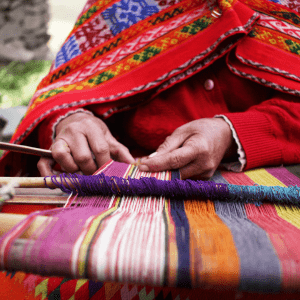As more and more social entrepreneurs show up in industry, both non-profit and for-profit, there is increasing overlap between the initiatives of the Social Enterprise and the Global Development Lab. While this integration will be a primary focus for the Hunt Institute in 2021, the overlap between entrepreneurship and innovation has been evident in past Institute projects, too, such as a report on the international handicrafts industry by Silvia Rivera ’18.
Rivera moved with her family from Chiapas, Mexico as a child. With this perspective, she has always been passionate about breaking down complex issues to empower underrepresented individuals. During her college journey at SMU, Rivera was immersed in exploring handicrafts and artisanal goods. She soon joined the Hunt Institute as an undergraduate researcher mentored by the Executive Director Dr. Eva Csaky. At the end of her senior year, Rivera’s findings lead her to conclude that handicrafts, “have a significant potential for social impact, both in terms of the income they generate and the cultural traditions they help preserve.”
Her research questions searched for a connection point to link local artisans with the global supply chain. Shortly before completing her work at SMU, Rivera journeyed to Washington D.C. for The Creative Economy Matters conference, which had a lasting impact on her. She produced a report titled “The Case for Handmade,” exploring the global artisan sector, its potential for impact, and both the challenges and opportunities involved in realizing this potential.
Foundational to inclusive economic development is the IE Model for entrepreneurs, corporations, and enablers developed by Dr. Csaky (see Applied IE Model below).

This model led Rivera to search for the multi-stakeholders, global forces, and the opportunity for inclusive growth to local economies. The abstract of her report states, “From the definition of artisanal activity, to its importance for poverty alleviation, to the various challenges and opportunities faced by artisans, businesses, and other sector stakeholders, this report concludes with a brief case-study of the DFW market for artisanal goods, attempting to put to the test ideas set forth herein on the global artisan sector and the key opportunities that may point the way forward.”
According to Rivera’s report, handicrafts are an essential source of secondary income. About 80% of artisans are women globally, and the handicraft industry was worth $32 billion in 2018. Because it is not capital intensive, the barriers to entry are low. Typically speaking, women reinvest 90% of earnings into their family and train other women, passing down their skills and knowledge. Her research found that these women were quite resourceful, using existing resources and materials to enhance the uniqueness of their handicrafts.
Rivera says, “But the potential for impact doesn’t stop there, like I mentioned earlier there are other cultural aspects to handmade goods that make them more than the sum of their parts, and part of that is that often that they are made by marginalized ethnic minorities using (again often but not always) traditionally environmentally friendly methods. This part of their potential needs more research and attention but does pop up in the literature.”
Women artisans help to support education, healthcare, and housing for themselves and their families. The industry serves as an important source of diversification, especially as climate change negatively affects rural agriculture. Challenges facing artisan women are well documented, country-specific, and difficult to overcome with a one-size-fits-all solution. Primary challenges include informality, aggregation, access to information, and access to finance. Finding opportunities to overcome these challenges is where the social impact space can help the most, investigating global connection points to consumer, entrepreneurial, and corporate trends for artisan groups.
To read more about the Hunt Institute’s work to develop future-focused solutions to some of the world’s biggest problems, please click here. For the latest news on the Hunt Institute, follow our social media accounts on LinkedIn, Facebook, Twitter, and Instagram. We invite you to listen to our Podcast called Sages & Seekers. If you are considering engaging with the institute, you can donate, or sign-up for our newsletter by emailing huntinstitute@smu.edu.







